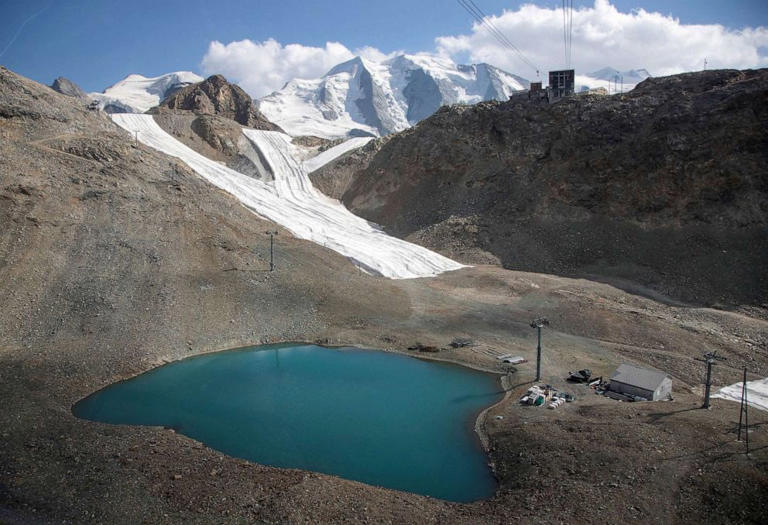This continent is the fastest-warming on the planet, according to new report
Yesterday
Climate change is taking a major human, economic and environmental toll in Europe, which has now been dubbed the fastest warming continent of the world, according to a new report.
Europe has been warming twice as much as the global average since the 1980s, the report, released Monday by Copernicus, the European Union's climate change service, and the World Meteorological Organization, states.

The sun sets over the capital's skyline as warm temperatures, wind and emissions combined to trigger a high alert for air pollution, in London, June 13, 2023
ABC News
Thousands forced to evacuate as wildfire rages in France amid heat waves
These fires have been burning since last month View on WatchDuration 4:11
Climate change is taking a major human, economic and environmental toll in Europe, which has now been dubbed the fastest warming continent of the world, according to a new report.
Europe has been warming twice as much as the global average since the 1980s, the report, released Monday by Copernicus, the European Union's climate change service, and the World Meteorological Organization, states.

The sun sets over the capital's skyline as warm temperatures, wind and emissions combined to trigger a high alert for air pollution, in London, June 13, 2023
.© Dylan Martinez/Reuters, FILE
Summer 2022 in Europe was characterized by rolling heatwaves, record-breaking temperatures and more than 1,100 heat-related deaths in a single event.
In 2022, Europe was approximately 2.3 degrees Celsius above the pre-industrial revolution average -- global temperatures between 1850 and 1900, which are used as a baseline for the Paris climate accord.MORE: Recent heat wave in the Mediterranean caused by climate change: Study
Several countries, including Belgium, France, Germany, Ireland, Italy, Luxembourg, Portugal, Spain, Switzerland and the U.K. had their warmest year on record in 2022, according to the report.
Europe's 2022 annual average temperature was between the second and fourth-highest on record, with an anomaly of about 0.79 degrees Celsius above the average between 1991 and 2020.

A couple ride a Vespa motorcycle past a street thermometer reading 44 degrees Celsius in Seville, April 26, 2023 as Spain is bracing for an early heat wave.
Summer 2022 in Europe was characterized by rolling heatwaves, record-breaking temperatures and more than 1,100 heat-related deaths in a single event.
In 2022, Europe was approximately 2.3 degrees Celsius above the pre-industrial revolution average -- global temperatures between 1850 and 1900, which are used as a baseline for the Paris climate accord.MORE: Recent heat wave in the Mediterranean caused by climate change: Study
Several countries, including Belgium, France, Germany, Ireland, Italy, Luxembourg, Portugal, Spain, Switzerland and the U.K. had their warmest year on record in 2022, according to the report.
Europe's 2022 annual average temperature was between the second and fourth-highest on record, with an anomaly of about 0.79 degrees Celsius above the average between 1991 and 2020.

A couple ride a Vespa motorcycle past a street thermometer reading 44 degrees Celsius in Seville, April 26, 2023 as Spain is bracing for an early heat wave.
© Cristina Quicler/AFP via Getty Images, FILE
Summers with extreme heat will likely be "frequent and more intense across the region" in the future, Copernicus Director Carlo Buontempo said in a statement.
"The record-breaking heat stress that Europeans experienced in 2022 was one of the main drivers of weather-related excess deaths in Europe," Buontempo said. "Unfortunately, this cannot be considered a one-off occurrence or an oddity of the climate."
The pattern of extreme heat has already continued into 2023. An early season heat wave that plagued countries along the Mediterranean sea such as Spain, Portugal, Morocco and Algeria in April was found to have been prompted by anthropologic, or human-caused, climate change, according to a study published last month.
In addition to extreme heat, the year was also marked by drought, wildfires and sea surface temperature reaching new highs, which were then accompanied by marine heatwaves, the report states.

The sun rises behind the BT Tower, as hot weather continues, in London, June 10, 2023.
Summers with extreme heat will likely be "frequent and more intense across the region" in the future, Copernicus Director Carlo Buontempo said in a statement.
"The record-breaking heat stress that Europeans experienced in 2022 was one of the main drivers of weather-related excess deaths in Europe," Buontempo said. "Unfortunately, this cannot be considered a one-off occurrence or an oddity of the climate."
:Record-breaking heat waves in US and Europe prove climate change is already here, experts say
The pattern of extreme heat has already continued into 2023. An early season heat wave that plagued countries along the Mediterranean sea such as Spain, Portugal, Morocco and Algeria in April was found to have been prompted by anthropologic, or human-caused, climate change, according to a study published last month.
In addition to extreme heat, the year was also marked by drought, wildfires and sea surface temperature reaching new highs, which were then accompanied by marine heatwaves, the report states.

The sun rises behind the BT Tower, as hot weather continues, in London, June 10, 2023.
© Toby Melville/Reuters
Meteorological, hydrological and climate-related hazards in Europe in 2022 resulted in 16,365 reported fatalities (many of them due to heat stress, the No. 1 weather-related killer in the world.
Glaciers in Europe lost a volume of about 880 cubic kilometers of ice from 1997 to 2022. The Alps were the worst affected, with an average reduction in ice thickness of 34 meters, the report said.MORE: Extreme heat taking its toll on US, European economies
In 2022, glaciers in the European Alps experienced "unprecedented" mass loss in one single year, caused by very low winter snow amounts, a very warm summer and Saharan dust deposition, the researchers said.
The report also noted a "hopeful future" for renewable energy, which generated more electricity on the continent than polluting fossil gas for the first time in 2022.

FILE - Snow from the last winter season is covered with blankets on a slope beside the top station of a cablecar at Diavolezza ski area near the Alpine resort of Pontresina, Switzerland, July 21, 2022.© Arnd Wiegmann/Reuters, FILE
Wind and solar power generated 22.3% of European Union (EU) electricity in 2022, overtaking fossil gas at 20%, the researchers said.
Increasing use of renewables and low-carbon energy sources is crucial to reduce dependence on fossil fuels,” World Meteorological Organization Secretary-General Petteri Taalas said in a statement. "Climate services play a key role in ensuring the resilience of energy systems to climate-related shocks, in planning operations, and in informing measures to increase energy efficiency.
Meteorological, hydrological and climate-related hazards in Europe in 2022 resulted in 16,365 reported fatalities (many of them due to heat stress, the No. 1 weather-related killer in the world.
Glaciers in Europe lost a volume of about 880 cubic kilometers of ice from 1997 to 2022. The Alps were the worst affected, with an average reduction in ice thickness of 34 meters, the report said.MORE: Extreme heat taking its toll on US, European economies
In 2022, glaciers in the European Alps experienced "unprecedented" mass loss in one single year, caused by very low winter snow amounts, a very warm summer and Saharan dust deposition, the researchers said.
The report also noted a "hopeful future" for renewable energy, which generated more electricity on the continent than polluting fossil gas for the first time in 2022.

FILE - Snow from the last winter season is covered with blankets on a slope beside the top station of a cablecar at Diavolezza ski area near the Alpine resort of Pontresina, Switzerland, July 21, 2022.© Arnd Wiegmann/Reuters, FILE
Wind and solar power generated 22.3% of European Union (EU) electricity in 2022, overtaking fossil gas at 20%, the researchers said.
Increasing use of renewables and low-carbon energy sources is crucial to reduce dependence on fossil fuels,” World Meteorological Organization Secretary-General Petteri Taalas said in a statement. "Climate services play a key role in ensuring the resilience of energy systems to climate-related shocks, in planning operations, and in informing measures to increase energy efficiency.
Story by AFP • Yesterday

Temperatures in Europe have risen 1.5C above preindustrial levels over the last 30 years

Temperatures in Europe have risen 1.5C above preindustrial levels over the last 30 years
© JORGE GUERRERO
Europe should brace for more deadly heatwaves driven by climate change, said a sweeping report on Monday, noting the world's fastest-warming continent was some 2.3 degrees Celsius hotter last year than in pre-industrial times.
Crop-withering drought, record sea-surface temperatures and unprecedented glacier melt are among the consequences laid out in a report by the World Meteorological Organization and the European Union's Copernicus Climate Change Service.
The continent, which has been warming at twice the global average since the 1980s, saw its warmest summer on record last year, with countries including France, Germany, Italy, Portugal, Spain and the United Kingdom experiencing their warmest year on record.
The world has warmed an average of nearly 1.2C since the mid-1800s, unleashing a devastating cascade of extreme weather, including more intense heatwaves, more severe droughts in some areas and storms made more ferocious by rising seas.

Chart showing reported meteorological, hydrological and climate-related hazards in Europe in 2022 and breakdown of affected people, deaths and economic damage by type of event
Europe should brace for more deadly heatwaves driven by climate change, said a sweeping report on Monday, noting the world's fastest-warming continent was some 2.3 degrees Celsius hotter last year than in pre-industrial times.
Crop-withering drought, record sea-surface temperatures and unprecedented glacier melt are among the consequences laid out in a report by the World Meteorological Organization and the European Union's Copernicus Climate Change Service.
The continent, which has been warming at twice the global average since the 1980s, saw its warmest summer on record last year, with countries including France, Germany, Italy, Portugal, Spain and the United Kingdom experiencing their warmest year on record.
The world has warmed an average of nearly 1.2C since the mid-1800s, unleashing a devastating cascade of extreme weather, including more intense heatwaves, more severe droughts in some areas and storms made more ferocious by rising seas.

Chart showing reported meteorological, hydrological and climate-related hazards in Europe in 2022 and breakdown of affected people, deaths and economic damage by type of event
© Sabrina BLANCHARD
Hardest hit are the most vulnerable people and the world's poorest countries, who have done little to contribute to the fossil fuel emissions that drive up temperatures.
But impacts are becoming increasingly severe across the world, with regions in the northern hemisphere and around the poles seeing particularly rapid warming.
In Europe, the high temperatures "exacerbated the severe and widespread drought conditions, fuelled violent wildfires that resulted in the second largest burnt area on record, and led to thousands of heat-associated excess deaths," said WMO Secretary-General Petteri Taalas.

Heat and drought combined to spark wildfires© LOIC VENANCE
Temperatures across the continent rose 1.5C in 30 years, from 1991 to 2021, according to the report, the State of the Climate in Europe 2022.
Severe heat left more than 16,000 people dead last year, the report said, while floods and storms accounted for most of the $2 billion in damages from weather and climate extremes.
"Unfortunately, this cannot be considered a one-off occurrence or an oddity of the climate," said Copernicus Director Carlo Buontempo in the report.
"Our current understanding of the climate system and its evolution informs us that these kinds of events are part of a pattern that will make heat stress extremes more frequent and more intense across the region."
The increasing temperatures have taken a toll on economies and ecosystems, the report said.
Hardest hit are the most vulnerable people and the world's poorest countries, who have done little to contribute to the fossil fuel emissions that drive up temperatures.
But impacts are becoming increasingly severe across the world, with regions in the northern hemisphere and around the poles seeing particularly rapid warming.
In Europe, the high temperatures "exacerbated the severe and widespread drought conditions, fuelled violent wildfires that resulted in the second largest burnt area on record, and led to thousands of heat-associated excess deaths," said WMO Secretary-General Petteri Taalas.

Heat and drought combined to spark wildfires© LOIC VENANCE
Temperatures across the continent rose 1.5C in 30 years, from 1991 to 2021, according to the report, the State of the Climate in Europe 2022.
Severe heat left more than 16,000 people dead last year, the report said, while floods and storms accounted for most of the $2 billion in damages from weather and climate extremes.
"Unfortunately, this cannot be considered a one-off occurrence or an oddity of the climate," said Copernicus Director Carlo Buontempo in the report.
"Our current understanding of the climate system and its evolution informs us that these kinds of events are part of a pattern that will make heat stress extremes more frequent and more intense across the region."
The increasing temperatures have taken a toll on economies and ecosystems, the report said.
- Renewable hopes -
In the Alps, glaciers saw a new record mass loss for a single year in 2022, caused by very low winter levels of snow, a hot summer as well as deposits of wind-blown Saharan dust.
The story was similar in the oceans, with average sea surface temperatures in the North Atlantic the hottest on record, with warming rates in the eastern Mediterranean Sea, the Baltic and Black Seas and the southern Arctic more than three times the global average.
Marine heat waves -- which can displace or even kill species -- also lasted for up to five months in several regions including the western Mediterranean Sea, English Channel and southern Arctic.
Rainfall was below normal across much of the continent, hitting agricultural production and water reserves while creating the conditions for wildfires.
The year saw the second-largest burnt area ion record in Europe, with large fires scorching across parts of France, Spain, Portugal, Slovenia and the Czech Republic.
The Spanish water reserve decreased to less than half of capacity by July as the Iberian Peninsula saw its fourth drier-than-average year in a row in 2022.
Farmers could not irrigate their fields in parts of France, while the dry conditions hit harvests for cereals and grapes in Germany.
The drought also affected energy production, leading to reductions in hydroelectric power as well as output from some nuclear power stations, which rely on water supplies for cooling.
- Renewable hope -
But, in one positive sign for the future, the report noted that wind and solar power generated 22.3 percent of European Union electricity in 2022, overtaking fossil gas (20 percent) for the first time.
The report said this was due to a combination of factors, including a "significant increase" in installed solar power last year.
While there has been no significant trend in wind or rain patterns in Europe over the last 30 years, the report said there was a marked increase in sunlight, with 2022 seeing the highest amount of solar radiation since records began in 1983.
"This report confirms two things that we already know well: that climate change is having severe impacts right now in Europe, but also that we already have the solutions we need to hand in the form of renewable energy technologies," said Leslie Mabon, Lecturer in Environmental Systems at The Open University, in response to the report.
klm/mh/pvh
No comments:
Post a Comment